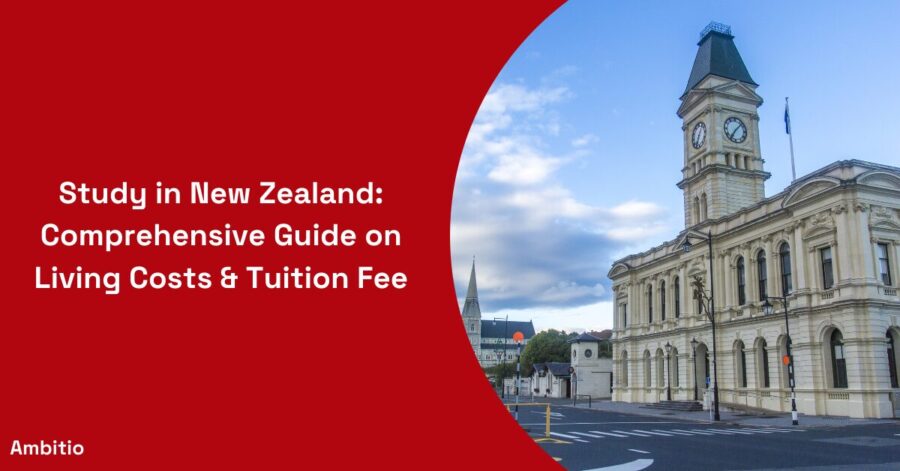14 December 2024
6 minutes read
Study in New Zealand: Comprehensive Guide on Living Costs & Tuition Fee

Introduction
New Zealand, often dubbed the ‘Land of the Long White Cloud’, beckons students from around the globe. Its unique blend of Maori heritage, exceptional educational standards, and breathtaking landscapes make it an ideal study destination. However, before packing your bags and setting forth on this academic adventure, it’s crucial to understand the expenses involved.
Why New Zealand?
- World-class Education:
- New Zealand hosts prestigious universities with high global rankings.
- Institutions like University of Auckland, Wellington offer strong academics and research chances.
- Diverse Cultural Experiences:
- Studying here means immersing in various cultures.
- Engage in Maori traditions, interact with diverse international peers.
- Adventure Awaits:
- Between studies, embrace thrilling experiences.
- Explore vast landscapes – Southern Alps’ snowy peaks, Bay of Islands’ serene beaches.
Breakdown of Tuition Fees
Understanding the tuition fee structure is paramount for financial planning.
Public vs. Private Institutions
- Public Universities: Typically, these institutions are more affordable. For instance, courses like arts or humanities range between NZD 20,000 to NZD 30,000 annually.
- Private Institutions: Often more specialized, the fees here can be significantly higher, especially for niche programs.
Course-wise Breakdown
- Science & Engineering: Expect NZD 25,000 to NZD 40,000 annually.
- Medicine: NZD 60,000 to NZD 150,000 annually, depending on specialization.
- Business & MBA: A diverse range from NZD 30,000 to NZD 60,000 annually, based on the program’s prestige.
Living Costs: A Deeper Dive
- Accommodation:
- University Residences: Costs vary, around NZD 14,000 to NZD 15,000 per year.
- Private Housing: Variable, between NZD 8,000 to NZD 12,000 annually.
- Homestays: About NZD 11,000 yearly, offers cultural immersion.
- Food & Dining:
- Groceries: NZD 3,000 to NZD 5,000 annually.
- Dining Out: Frequent dining out or gourmet options can increase costs.
- Utilities and Connectivity:
- Electricity, Water, Internet: Around NZD 1,500 to NZD 2,500 per year.
- Electricity, Water, Internet: Around NZD 1,500 to NZD 2,500 per year.
Additional Costs
Transportation
Depending on where you reside, monthly transport passes might range from NZD 120 to NZD 200.
Healthcare & Insurance
International students must have a valid health insurance policy, usually costing around NZD 500 to NZD 700 annually.
Miscellaneous Expenses
These can include recreational activities, personal care, and unexpected expenses. Budgeting an additional NZD 3,000 annually is prudent.
Working & Studying: Balancing Act
A great way to offset some costs is by engaging in part-time work.
Part-time Work
- Opportunities: Retail, cafes, on-campus jobs, and more.
- Wage Insights: The minimum wage hovers around NZD 20 per hour, translating to decent earnings for part-timers.
Post-study Work
Many international students choose to extend their New Zealand journey by diving into the professional realm. Sectors like IT, health, and tourism often have lucrative openings.
Scholarships: Reducing the Burden
Numerous scholarships cater to various student profiles.
Government Scholarships
New Zealand offers several scholarships for international students, such as the New Zealand ASEAN Scholar Awards.
University-based Scholarships
Many universities have merit-based or needs-based scholarships. For instance, the University of Canterbury offers the UC International First Year Scholarship.
External Organizations
Various organizations, NGOs, and trusts offer scholarships based on different criteria.
New Zealand: A Closer Look at Cities
The costs can fluctuate depending on which city you choose for your academic pursuits. Each city has its charm, culture, and economic structure. Here’s a closer look:
Auckland
- Living: As New Zealand’s largest city, Auckland has higher living costs. Monthly rent can range from NZD 1,200 to NZD 2,500 for a one-bedroom apartment.
- Transportation: With an expansive public transport system, students can expect to spend around NZD 150 monthly on transportation.
Wellington
- Living: Slightly cheaper than Auckland, expect to pay around NZD 1,000 to NZD 2,200 for a one-bedroom place.
- Transportation: Wellington’s compact nature means less reliance on public transport, saving costs.
Christchurch
- Living: Being the largest city on the South Island, rents here vary but are generally more affordable than in Auckland or Wellington. You could find places between NZD 900 and NZD 2,000.
- Transportation: With an evolving transport infrastructure after the earthquakes, monthly transportation costs hover around NZD 130.
Understanding the NZ Student Visa
Before arriving, it’s essential to grasp the intricacies of the New Zealand student visa:
Eligibility
- Enrollment in an approved course.
- Proof of funds for tuition and living.
- Health and character clearance.
Visa Costs
The student visa application fee varies, often around NZD 275. Additional charges might include medical examinations or police verifications.
Work Rights
With a student visa, you can work up to 20 hours per week during academic sessions and full-time during breaks.
The Allure of the Kiwi Culture
Blending in with the Kiwi culture can be one of the most enriching experiences. From rugby matches to exploring Maori traditions, students get to immerse themselves in a unique societal tapestry.
Maori Traditions
The indigenous Maori culture holds deep significance. International students often partake in events, learning the ‘Haka’ or enjoying a traditional ‘Hangi’ meal.
Sports & Recreation
Rugby isn’t just a sport but a religion in New Zealand. Be it supporting the All Blacks or enjoying a game of cricket, sports form an integral cultural component.
Challenges & How to Overcome Them
No journey is without its challenges, and studying abroad is no exception. Here’s how to navigate:
Homesickness
Engage in campus activities, join international clubs, or explore local events. Keeping busy helps!
Academic Adjustments
The teaching style might differ from what you’re accustomed to. Join study groups, consult professors, and utilize university resources.
Budgeting
Track expenses, opt for student discounts, and explore cost-effective options.
The Big Picture: Return on Investment
After the academic journey, many students find that the exposure, quality education, and life experiences in New Zealand offer a significant return on investment. The country’s robust job market, especially in sectors like IT, healthcare, and tourism, offers lucrative opportunities for graduates.
Job Opportunities After Graduation
One of the major attractions for international students is the prospect of employment in New Zealand post-graduation. Here’s what you can anticipate:
In-Demand Sectors
- Information Technology (IT): With a burgeoning tech scene, New Zealand offers numerous opportunities for software developers, IT consultants, and data analysts.
- Healthcare: There’s a consistent demand for medical professionals, including doctors, nurses, and healthcare managers.
- Agriculture & Forestry: Being a primary industry, opportunities in agronomy, forestry management, and biotechnology are plentiful.
Post-Study Work Visa
New Zealand provides a post-study work visa that allows graduates to work for any employer in any profession. This can be an excellent way to gain work experience and potentially pave the way for permanent residency.
Exploring Scholarships and Financial Aids
Affording international education can be less daunting when you explore scholarships:
Government Scholarships
The New Zealand government offers scholarships to students from specific countries, focusing on particular study fields to foster bilateral ties.
University-specific Scholarships
Almost every major institution in New Zealand offers scholarship programs for high-achieving international students. Research your preferred university’s website for more details.
External Scholarships
Organizations outside the educational sphere, such as foundations, trusts, and corporations, often offer scholarships based on academic merit, field of study, or extracurricular achievements.
The New Zealand Student Community
Engaging with the student community can make the academic journey fulfilling:
Student Associations
These are platforms where students can voice concerns, get academic support, and participate in recreational activities.
International Student Clubs
These clubs foster a sense of belonging and provide a home away from home, hosting cultural nights, get-togethers, and excursions.
Support Services
From counseling to academic support, universities in New Zealand are equipped with services to ensure students’ well-being and success.
Local Experiences: Beyond the Classroom
Studying isn’t just about textbooks and lectures:
- Adventure Sports:
- Birthplace of bungee jumping, offers skydiving, skiing, and whitewater rafting.
- Birthplace of bungee jumping, offers skydiving, skiing, and whitewater rafting.
- Nature Trails:
- Mesmerizing landscapes – beaches, snowy mountains, lush forests to explore.
- Mesmerizing landscapes – beaches, snowy mountains, lush forests to explore.
- Culinary Journey:
- Delve into diverse culinary scene.
- From traditional Maori dishes to contemporary cuisine, a world of flavors to explore.
Conclusion
Though the dream of studying in New Zealand comes with its set of expenses, it’s an investment in unparalleled education and life experiences. With proper planning, scholarships, and part-time work, the financial aspect becomes more manageable.
FAQs
Is New Zealand more expensive than Australia or Canada for students?
Each country has its own set of expenses, but on average, New Zealand’s cost of living is somewhat comparable to Australia and slightly cheaper than some parts of Canada.
Are there any specific scholarships for Asian or European students?
Yes, there are region-specific scholarships like the New Zealand ASEAN Scholar Awards or the New Zealand Excellence Awards for students from India.
What’s the average monthly rent in Auckland?
Depending on the area and type of housing, rents can range from NZD 1,000 to NZD 2,500 monthly.
How easy is it to find part-time work as an international student?
Many students find work in sectors like hospitality, retail, or on-campus jobs. It’s relatively easier in bigger cities.
Can I stay in New Zealand after my course ends?
Yes, New Zealand offers post-study work visas for qualified students, allowing them to work post-graduation.
Do universities in New Zealand offer on-campus accommodations?
Yes, most universities offer on-campus or nearby student residences, though spaces can be limited.
How’s the weather in New Zealand for someone coming from a tropical country?
New Zealand has a temperate climate. Summers are mild, and winters can be cold, especially on the South Island. It’s a change from tropical climates, but many find it pleasant.
Is English the primary medium of instruction?
Yes, all courses in major universities are taught in English.
Can family members visit students in New Zealand?
Yes, family members can apply for visitor visas to visit students.

You can study at top universities worldwide!
Get expert tips and tricks to get into top universities with a free expert session.
Book Your Free 30-Minute Session Now! Book a call now




























